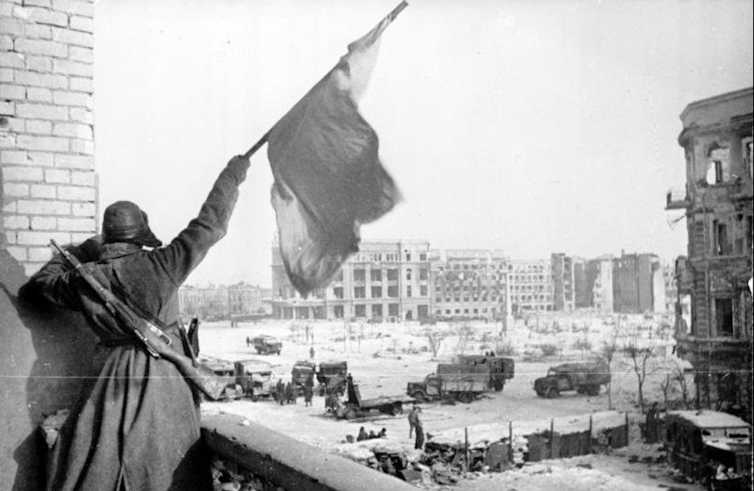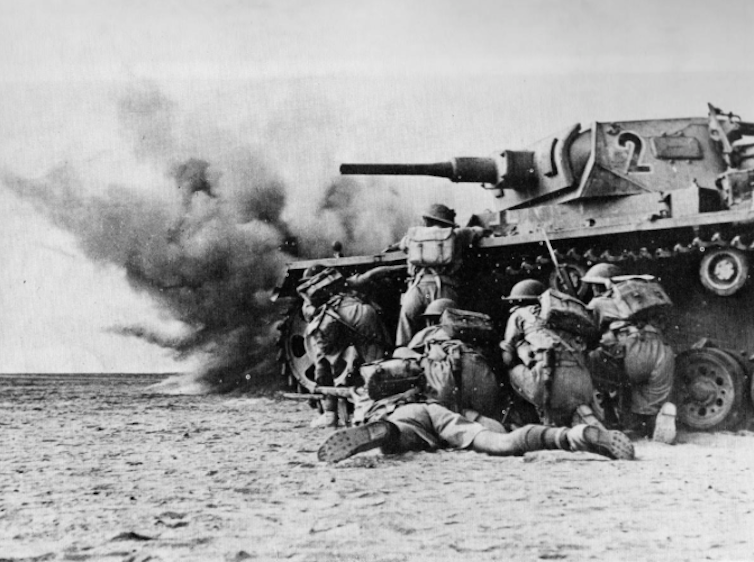from The Conversation
— this post authored by Ben Shepherd, Glasgow Caledonian University
The city of Stalingrad was in ruins as the Russian winter of 1942-43 took hold. For nearly three months it had been the battleground in which the Red Army had dug in to prevent the advance of the Nazis and their allies – and the vicious fighting had reduced much of the city to rubble. An early Axis victory would have freed up powerful forces from Hitler’s southern group of armies for the drive on the important oilfields of the Caucasus.

Please share this article – Go to very top of page, right hand side, for social media buttons.
Beyond its strategic significance, Stalingrad was also of huge symbolic importance to the Soviets, since it bore the name of their great dictator.
The pivotal moment came on November 19, 1942 when the Red Army unleashed Operation Uranus. It was a powerful counterattack to the north and south of the city, targeting the Romanian battalions that the Soviets judged to be the weakest links in the Axis defence line.
Some 300,000 German soldiers ended up trapped in the remains of the city, and the great siege of Stalingrad began. It would take until the following February before the survivors surrendered, having lived through inhuman conditions all winter. It became the single greatest defeat inflicted upon the Germany army in its history until that point.
Soviet soldier raises red flag in Stalingrad, 1943. Wikimedia
Stalingrad, present-day Volgograd, was the site of the larger and fiercer of two battles that month 75 years ago which bore all the ingredients of the Allied triumph that was to come. The other was the second Battle of El Alamein, the British Eighth Army’s decisive victory in Egypt.
Though eventually winning World War II was due more to the awe-inspiring economic power of the United States and the immense sacrifice of the Soviet Union than to any individual battle, both these victories were severe blows to Hitler and his allies. In our current era of growing British isolationism and mounting Western distrust of the Russians, they also contain important lessons that are worthy of reflection.
El Alamein
Britain’s victory at El Alamein (October 23 to November 4, 1942) was incredibly important – revisionists are wrong to belittle it as a mere sideshow to the Red Army’s far larger struggle on the Eastern Front.
Forcing Field Marshal Erwin Rommel’s Axis forces out of Egypt once and for all wasn’t just Britain’s first major land-based victory over the Germans since the war’s start – though the battle deserves great fame for that alone. Driving the Axis far beyond reach of the Suez Canal and the Middle East’s oil was a vital stage in a much larger campaign across the Mediterranean and North Africa which, had it gone the other way in 1942, might have deeply debilitated the speed and certainty of eventual Allied victory.
Allied troops taking cover at El Alamein. Wkimedia
Winning in Egypt, rather than merely avoiding defeat, also helped demonstrate to the Americans that the British were serious about beating the Germans. It helped ensure continued US commitment to a “Germany-first” policy of prioritising the war against Hitler and his European allies over imperial Japan. Finally, the wider North African and Mediterranean campaign was vital rehearsal space for Western Allied troops before the more daunting task of assaulting German-occupied France on D-Day.
But while the victory was British-led, helmed by British general Sir Bernard Montgomery – who had a formidable grasp of battlefield management – it was not exclusively British-won. The Eighth Army was a diverse multinational force, encompassing troops not only from the British Isles but also from Empire and Commonwealth countries and the lands of occupied Europe. Much of its armoured punch was composed of US-built Grant tanks.
El Alamein showed what the British can achieve in close partnership with other peoples and nations. Contrary to what Christopher Nolan’s recent movie Dunkirk implied, if inadvertently, Britain did not win World War II in a state of splendid isolation. This notion was eloquently trashed by Sir Max Hastings recently, and it’s something the more ardent Brexiteers would do well to remember.
Understanding Russia
Stalingrad throws the multinational character of the Allied triumph during November 1942 into even starker relief. The blood price the Soviet Union paid both in that battle and during the war as a whole – and the toll they took on Hitler’s forces – compels us to reflect still further on just how much Britain’s national successes are achieved in partnership.
Putinator. Wikimedia.
It also helps the difficult but necessary effort of comprehending Russia today. The fact that during World War II at least 11m Russian soldiers died along with millions more civilians, brings invaluable perspective to the nation’s ongoing fear of outside forces today. It helps explain the potency of Vladimir Putin’s image – cynically manufactured though it may be – as a strong shield against the outside world. If Western relations with the Russians are ever to be constructive, this needs recognised.
Only a few short years linked the victory at Stalingrad with the Red Army’s further emphatic successes as it pushed westward toward Berlin, followed by the descent of the Iron Curtain across Europe in 1946. This heralded that rigid division between East and West that lasted more than four decades before resuming, only slightly less rigidly, in recent years.
To contextualise the British and Allied successes of November 1942 in such ways is to acknowledge fundamental truths about present-day international affairs and how Britain, and the West more widely, might fare better.
 Allied victory that month – and then winning the war in 1945 – was achieved by a painstakingly constructed multinational coalition from across Europe and the wider world in which the Russians and other nations were absolutely integral. Grasping this hard-won and invaluable achievement would benefit the cause of constructive and fruitful international cooperation now and for years to come.
Allied victory that month – and then winning the war in 1945 – was achieved by a painstakingly constructed multinational coalition from across Europe and the wider world in which the Russians and other nations were absolutely integral. Grasping this hard-won and invaluable achievement would benefit the cause of constructive and fruitful international cooperation now and for years to come.
Ben Shepherd, Reader, History, Glasgow Caledonian University
This article was originally published on The Conversation. Read the original article.










